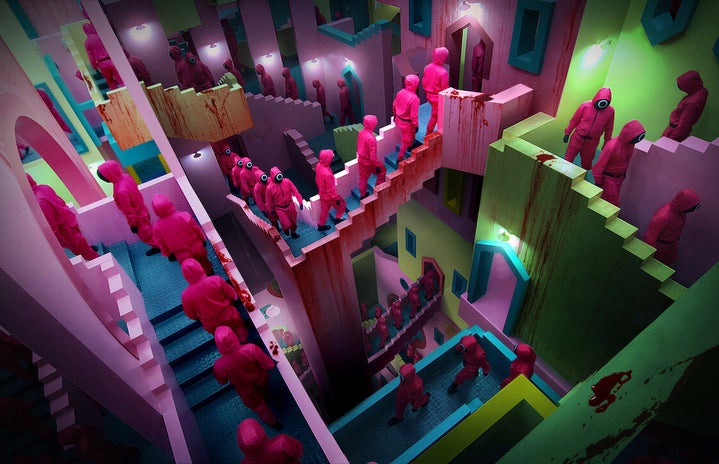Squid Game is a Netflix original series created by Hwang Dong-hyuk about a group of 456 players who leave their poverty-stricken lives to compete in a deadly set of children’s games for the chance to win an incredible cash prize. It centers around Seong Gi-hun (portrayed by Lee Jung-jae) as he attempts to survive long enough to win while also maintaining his own humanity under such desperate circumstances. It is, all in all, a scathing criticism of systemic class inequality with incredible art design and a healthy dose of horror. It is a great show (if you can handle the gore) and it has taken the world by storm.
That being said, there has been some discourse surrounding the major plot twist of the series. While some people were confused by it, others had taken note of earlier foreshadowing and didn’t really mind it. On the other extreme, some totally hated it and think that it didn’t work at all or make sense in the context of the rest of the show. I’ll admit, it caught me off guard at first, too. I didn’t really like it, but I accepted it and moved on. Then I started to think about it, and over the course of a couple of days, I came to the conclusion that there is more to this twist than meets the eye. In this article, I want to discuss the implications of this plot twist and why I, a random person on the internet, believe that it works.
For the six people who haven’t already watched Squid Game, the rest of this article is going to have some major spoilers, so definitely go check out the show on Netflix before you read any further.
During his time in the game, Gi-hun gets to know a handful of other players, including an old man with a brain tumor named Oh Il-nam (portrayed by Oh Yeong-su). Like Gi-hun, the audience gets attached to Il-nam. We appreciate his dedication to what is right and good when he votes to end the game in Episode Two. We admire his wit and strategy when he saves his team during tug-of-war. We feel for him as one of the physically weaker characters when no one wants to partner with him in Episode Six, and we mourn his loss when he dies later in that episode. He’s a favorite among online fans (at least those who haven’t yet seen the finale), and his sincerity brings another dimension to the show whenever he is on screen.
So WHY, pray tell, would the writers choose to make Il-nam, of all people, the last-minute twist villain of the whole series? In the final episode, the audience, along with Gi-hun, discover that Il-nam is the true creator of the game. He made it as entertainment for people like him who were so rich they were bored with it, and he was only playing so that he could experience some thrill before he died of his brain tumor. In an instant, our image of Il-nam as a frail old man who helped Gi-hun and others survive and who brought an edge of hope to a horrible situation is totally shattered. On a first watch, this twist feels shoe-horned in. Just a simple bait and switch. The “character assassination” of Il-nam is so jarring that I think audiences are resistant to understanding the role that Il-nam plays in the overall story and its themes. Il-nam’s character is a portrait of a rich person who believes that the system of the game is a fair one. He genuinely believes that the game puts people on equal footing, that people choose the game because they want to participate, and that those who win the game have done so through only their own talents and abilities, even as the game itself proves that none of this is the case. Every choice his character makes fits into this worldview. The reveal that he is the creator adds to a second viewing because it demands that viewers engage with how a skewed sense of morality undermines every piece of idealogical branding under which the game operates.
The game’s frontman and other authority figures constantly insist that the game makes everyone equal; this is a mission we later discover comes from Il-nam himself and in some senses, this is true. Statistically, everyone has a 1/456 chance of winning the money. In the first game, when no one knows what the game will look like, everyone has the same equipment and clothing. And (most glaringly upon a rewatch), everyone besides Il-nam seems to be relatively young and in good health, so theoretically all of the players are evenly matched. However, as the games progress, this illusion of equality breaks down, most notably with the sub-plot of the doctor, Byeong-gi, being given special treatment in exchange for helping the guards make money on the black market. He is rewarded with information that saves his life more than once. This inequality is punished and the game authorities make sure to make an example of the doctor and the guards for their tampering with the ideological purity of the games, but other inequalities go unmentioned and unacknowledged by the game authorities. For example, it is made clear in the tug-of-war episode that women are discriminated against when it comes time to split into teams because many of the men believe that women won’t be smart, fast, or strong enough to help the team survive during the game. People who grew up in South Korea and are familiar with the games have a major advantage over foreign players like Ali, who have to rely on the benevolence of their competitors to understand some of the rules. After everyone comes back in Episode Two, several players have taken the chance to prepare for the games, which for many included smuggling in weapons or tools to help them succeed. Those who appear physically weaker, who didn’t prepare, or who don’t have a background in the games are the characters who die first. Il-nam’s insistence that the games create a fair playing field where anyone may have the chance to succeed is a total delusion, and it is completely at odds with the system he has built. However, he is above the system. He plays in it without fear. He has the inside information that will keep him alive and an agreement with the guards that he is not to be harmed or killed. The reveal illustrates his hypocrisy but also his blind faith in a system that is built in a way that will fail anyone who does not either already know how to succeed in it or is otherwise privileged towards success through sheer luck and the acquisition of insider information.
Part of Il-nam’s guiltlessness about creating the games comes from this idea that no one is required to participate: they sign up themselves and if the majority of players agree to stop playing, they are allowed to go home. In his eyes, this is completely fair. People play because they want to try to win the money. However, he clearly knows that this is not the case. The game authorities reiterate again and again that the players have almost no chance of ever making it out of poverty and debt out in the “real world.” Il-nam even says so himself in an incredibly manipulative conversation with Gi-hun in episode two. It is especially sinister when you realize what this mantra of “the outside world is hell and our only chance to make it is in the game” really means. Il-nam does not believe that a life in poverty is one worth living. He believes that not only do people choose to die trying to get the money, but that this is the right choice. This is a bold statement from a character that has not lived in poverty for a very long time, if ever. Beyond even the pressure of the outside world driving characters back to the games, there’s the fact that the players all signed their contracts before being told about the mortal danger they would face in the games. The 255 players killed in the first game were never given a chance to opt-out or alerted of the risk, and most of them died before the rules were ever clarified. The illusion of choice is taken further with the idea of the vote: the game will end if the majority agrees to leave. First of all, a vote must be called for by the players themselves–they are not offered this chance by the authorities. Second of all, there is no way for an individual to choose to opt-out of the system as it is made clear that they will be killed if they refuse to play. There is no individual choice, only the choice of the whole, and boy howdy if the whole isn’t being manipulated at every turn by a giant money-filled piggy bank and constant exposure to the idea that they’re worth more dead in the games than alive in poverty in the real world. Because Il-nam wants the game to keep going. He likes it, he thinks it’s fun, he’s in no real danger, and he can capitalize on the whole thing through the VIP betting system and the connections he makes with other rich people. There is also the choice of shape, choice of teams, choice of partners, and choice of numbered jerseys. All of these choices are made without any context–the players know that it’s life or death, but they aren’t given the tools to make informed choices. The pre-game choices may as well be assigned, because the characters are going in blind as to how their choices will impact the actual gameplay, anyways. Choice, like equality, is just another coat of ideological paint that Il-nam uses to cover up the cracks in this broken and amoral system he’s built for his own benefit.
Il-nam believes that the games will be won by someone who deserves it, someone who in the face of dire circumstances pulled themselves up from nothing and took ownership of the opportunity that Il-nam provided for them. There is an implication that if the players are all made equal by the structure and rules of the game, then those who are uniquely intelligent, strong, or resourceful will ultimately prevail over the others. Whoever wins will do so because they deserve it. But when you look at the facts, people don’t succeed in the games based solely on their own merit. Players learn from each other and copy one another. One example of this is when Gi-hun licks the dalgona to free his shape in episode three and other players catch on and follow his lead. In the very next game, Gi-hun’s team wins because Il-nam has insider information about how to play and Sang-woo comes up with a last-minute plan that saves everyone. However, the best example of this is during the glass platform game, where the later players are given an advantage because they can learn from the paths taken by the earlier players. Gi-hun mostly wins because he got lucky. Sang-woo and Saebyeok also make it as far as they do because they got lucky and could learn from their other players. Il-nam wants the money to go to someone “worthy,” but there is no such thing as worthiness in these games. Everyone needs the money, everyone is willing to die for it, but individual wit and strength can only carry you as long as you do not stumble into a random disadvantage (like Saebyeok being injured by the glass explosion) or are not passed over by a random advantage (like the team that loses to Gi-hun’s team because they did not have access to Il-nam’s insider strategy). Il-nam’s early success in the games is a perfect example of this. He knows how to play red-light, green-light without getting hurt and even steps in rhythm with the song. When given the choice of a shape, he picks the easier star, because he knows that they are about to play the dalgona game. And obviously, he knew exactly what to do for tug-of-war. Even though he is at a physical disadvantage, he is supported by his intimate knowledge of how the games work, which keeps him safe while other players have to deal with confusion, fear, and life-or-death stakes as they play alongside him. Of course, he isn’t playing to win, but he does seem to take a lot of joy in his victories, which comes across on a first watch as, like, some quirky old man whimsy but turns super evil thrill-seeking creepiness on a second viewing. This idea of winning=deserving even impacts the audience. His success early on plays a major role in winning us over to loving his character. We think he’s winning because he deserves it for being smart and kind, but really it’s because he’s working a system he created to his own advantage.
All this to say, the morality of the games is rooted in flawed assumptions about the system that Il-nam has created. There are several themes that are integral to the overall message of Squid Game: equality is a practice, not just a statement; choice is only powerful in context, and success does not equate to superiority. This plot twist works because the character of Il-nam the villain, Il-nam the secret creator, makes it impossible to rewatch this series without paying close attention to these themes and taking note of the way they play out in the text. When Gi-hun asked Il-nam “why?” in the last episode, I think we all found Il-nam’s answer to be unsatisfying. But that is not what Il-nam’s character is there to do in the story. The question that this plot twist demands we ask is not “why,” but “how.” How are broken systems designed, and based on what assumptions? How does reality reflect the ideological branding of a system? How does one man or one group have the power to build these systems? This plot twist ultimately leaves us all with the question that plagues Gi-hun at the end of the series: “What on earth can we do about it?”


